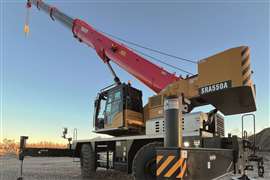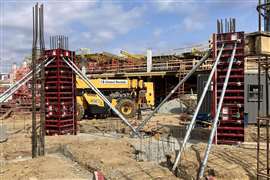CECE examines MFF proposals
13 September 2018

CECE (the Committee for European Construction Equipment) is calling on the European Parliament and Council to come to an agreement on the next seven-year financial perspective to ensure a smooth transition for the flagship programmes of the EU.
The association welcomed the long-term budget’s main pillars that would have an impact on the construction machinery industry it represents.
The EU long-term budget planning – also called Multiannual Financial Framework (MFF) – is organised in seven-year cycles, with the current one finishing at the end of 2020.
In May 2018, Commission president Jean-Claude Juncker presented the proposal for the MFF covering the period 2021 to 2028.
CECE said it appreciated, in particular, the additional allocation to the Connecting Europe Facility (CEF), the EU fund for infrastructure development.
It added that the creation of the Digital Europe programme was a positive new idea, which it said should be accompanied by clear prioritisation in terms of funding, for projects aimed at the digital development of the construction industry.
Juncker’s proposal for the next EU budget cycle, amounted to almost €1.3 trillion, which CECE said constituted 1.14% of the total gross national income (GNI) of the EU Member States. It pointed out that even though this was substantially lower than the European Parliament’s call to reach 1.3% of GNI, the proposal represented an increase – especially considering that this will be the first MFF after Brexit (the UK’s decision to leave the EU), with only 27 contributing countries.
The lion’s share is allocated to the Cohesion Fund and the Common Agricultural Policy, which together absorb close to 65% of the whole amount, albeit both reduced in overall allocation and in percentage compared to now.
CECE said it approved of the European Commission’s intention not to decrease the EU multiannual budget, most of all when considering the many challenges facing the EU.
It said, “We now call on the European Parliament to welcome this ambition, even if short of the 1.3% GNI threshold that MEPs had called for. Indeed, while the Commission’s proposal has set the bar high, it is now up to the co-legislators to deliver on this potential and to do so in a timely manner.”
CECE said it believed that there was no time to lose, considering that European industry faced increasingly fierce competition globally.
“Such a proposal for MFF has the potential to help manufacturing industries, such as construction machinery, master today’s and tomorrow’s challenges, in order to maximise the benefits for all European citizens.”
CECE singled out three areas of the budget proposal which it felt were of particular relevance to the construction equipment sector and to the wider construction industry.
Infrastructure
On infrastructure, it said the Commission had proposed confirming the CEF, with a total allocation of €42 billion – a 47% increase. Its biggest element, CEF Transport, has a budget envelope of €30 billion, mainly going towards the completion of the Trans-European Transport Network (TEN-T).

CECE congratulated the European Commission on such a strong push for CEF, which it said came from a concrete awareness that European infrastructure needed more resources, in terms of upgrade and maintenance most of all.
The European Commission also pledged to devote resources to the road infrastructure area of CEF, which is also important, according to CECE.
“We call on the European Parliament and Council not to distort such focus and not to decrease funding.”
Digital
Another major new proposal from the Commission is the Digital Europe programme, with a total allocation of €9.2 billion. This is in addition to €3 billion allocated to digital infrastructure within CEF, which CECE said it particularly appreciated, but called on the Parliament to increase this allocation.
CECE said the most innovative element of the Digital Europe programme was its comprehensive nature, with five focus areas – supercomputing, artificial intelligence, cybersecurity, digital skills, and support for digitalisation.
CECE fully backs the proposal to create a proper digital programme, to continue and expand the effort of the Digitising European Industry initiative.
Research and Innovation
Within the MFF proposal, the European Commission announced “the landmark and ambitious figure” of €97 billion for the Horizon Europe research and innovation programme. CECE pointed out that this was a substantial increase on the current allocation of roughly €60 billion for Horizon 2020.
CECE said it believed that, while implementing Horizon Europe, the EU had to ensure industry’s participation throughout the whole programme and strengthen links with academia and education.






